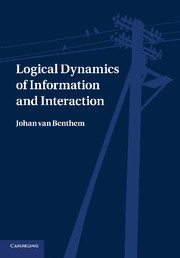Book contents
- Frontmatter
- Contents
- Preface
- Acknowledgments
- 1 Logical dynamics, agency, and intelligent interaction
- 2 Epistemic logic and semantic information
- 3 Dynamic logic of public observation
- 4 Multi-agent dynamic-epistemic logic
- 5 Dynamics of inference and awareness
- 6 Questions and issue management
- 7 Soft information, correction, and belief change
- 8 An encounter with probability
- 9 Preference statics and dynamics
- 10 Decisions, actions, and games
- 11 Processes over time
- 12 Epistemic group structure and collective agency
- 13 Logical dynamics in philosophy
- 14 Computation as conversation
- 15 Rational dynamics in game theory
- 16 Meeting cognitive realities
- 17 Conclusion
- References
- Index
12 - Epistemic group structure and collective agency
Published online by Cambridge University Press: 07 October 2011
- Frontmatter
- Contents
- Preface
- Acknowledgments
- 1 Logical dynamics, agency, and intelligent interaction
- 2 Epistemic logic and semantic information
- 3 Dynamic logic of public observation
- 4 Multi-agent dynamic-epistemic logic
- 5 Dynamics of inference and awareness
- 6 Questions and issue management
- 7 Soft information, correction, and belief change
- 8 An encounter with probability
- 9 Preference statics and dynamics
- 10 Decisions, actions, and games
- 11 Processes over time
- 12 Epistemic group structure and collective agency
- 13 Logical dynamics in philosophy
- 14 Computation as conversation
- 15 Rational dynamics in game theory
- 16 Meeting cognitive realities
- 17 Conclusion
- References
- Index
Summary
While we have looked extensively at individual agents and their interaction, a further basic feature in rational agency is the formation of collective entities: groups of agents that have information, beliefs, and preferences, and that are capable of collective action. Groups can be found in social epistemology, social choice theory, and the theory of coalitional games. Some relevant notions occurred in the preceding chapters, especially common knowledge – but they remained a side theme. Indeed, the logical structure of collectives is quite intricate, witness the semantics of plurals and collective expressions in natural language, which is by no means a simple extension of the logic of individuals and their properties. This book develops no systematic theory of collective agents, but this chapter collects a few themes and observations, connecting logical dynamics to new areas such as social choice.
Collective agents in static logics
Groups occur in the epistemic logic of Chapter 2 with knowledge modalities such as CGϕ or DGϕ. But the logic had no explicit epistemic laws for natural group forming operations such as G1 ∪ G2, G1 ∪ G2. Actually, two logics in this book did provide group structure. One is the epistemic version E-PDL of propositional dynamic logic in Chapter 4, where epistemic program expressions defined complex ‘collective agents’ such as i ; (?p ; j∪k)*. Another was mentioned in Chapter 2: the combined topologies of van Benthem & Sarenac (2005). Even so, epistemic logic still needs a serious extension to collective agents: adding common or distributed knowledge is too timid. Here, group structure and information may be intertwined: for instance, membership of a group seems to imply that one knows this. Moreover, groups also have beliefs and preferences, and they engage in collective action. In all these cases, generalization may not be straightforward. Collective attitudes or actions may reduce to behaviour of individual group members, but they need not. One sees this variety with collective predicates in natural language, such as ‘Scientists agree that the Earth is warming’, or ‘The sailors quarrelled.’ There is no canonical dictionary semantics for what these things mean in terms of individual predication. Finally, there is a temporal aspect. Groups may change their composition, so their structure may be in flux, with members entering and leaving – and then, dynamic and temporal logics come into play.
- Type
- Chapter
- Information
- Logical Dynamics of Information and Interaction , pp. 253 - 267Publisher: Cambridge University PressPrint publication year: 2011



